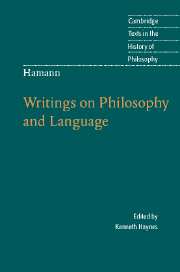Book contents
- Frontmatter
- Contents
- Introduction
- Chronology
- Further reading
- Note on the text, translation, and annotation
- WRITINGS ON PHILOSOPHY AND LANGUAGE
- Two dedications, from Socratic Memorabilia (1759)
- Essay on an Academic Question (1760)
- Miscellaneous Notes on Word Order in the French Language (1760)
- Cloverleaf of Hellenistic Letters (1762)
- Aesthetica in Nuce (1762)
- The Last Will and Testament of the Knight of the Rose–Cross (1772)
- Philological Ideas and Doubts (written in 1772)
- To the Solomon of Prussia (written in 1772)
- New Apology of the Letter h (1773)
- Golgotha and Sheblimini! (1784)
- Metacritique on the Purism of Reason (written in 1784)
- From Disrobing and Transfiguration: A Flying Letter to Nobody, the Well Known (1786)
- Index of biblical passages
- Index of names
- CAMBRIDGE TEXTS IN THE HISTORY OF PHILOSOPHY
Introduction
Published online by Cambridge University Press: 05 June 2012
- Frontmatter
- Contents
- Introduction
- Chronology
- Further reading
- Note on the text, translation, and annotation
- WRITINGS ON PHILOSOPHY AND LANGUAGE
- Two dedications, from Socratic Memorabilia (1759)
- Essay on an Academic Question (1760)
- Miscellaneous Notes on Word Order in the French Language (1760)
- Cloverleaf of Hellenistic Letters (1762)
- Aesthetica in Nuce (1762)
- The Last Will and Testament of the Knight of the Rose–Cross (1772)
- Philological Ideas and Doubts (written in 1772)
- To the Solomon of Prussia (written in 1772)
- New Apology of the Letter h (1773)
- Golgotha and Sheblimini! (1784)
- Metacritique on the Purism of Reason (written in 1784)
- From Disrobing and Transfiguration: A Flying Letter to Nobody, the Well Known (1786)
- Index of biblical passages
- Index of names
- CAMBRIDGE TEXTS IN THE HISTORY OF PHILOSOPHY
Summary
Johann Georg Hamann (1730–88) is prominent in the history of German literature, being known above all for an idiosyncratic and sometimes bizarre style that was intransigently at odds with the aesthetics of his time and which fascinated and sometimes influenced writers of the nineteenth century. He is one of the most innovative figures within Lutheran theology and arguably “the most profound Christian thinker of the eighteenth century”; his insistence on the historical truth of the Bible led him to a radical rethinking of the nature of both history and truth. Finally, he is a philosopher who wrote penetrating criticisms of Herder, Jacobi, Kant, and Mendelssohn; who gave philosophical attention to language in a way that, at times, seems strikingly modern; but whose own philosophical positions and arguments remain elusive.
Hamann was a minor civil servant for most of his adult life, working in Königsberg as part of the widely hated tax administration of Frederick the Great. He never attained any sort of significant professional success; friends had to intervene to prevent the sale of his library and to fund the education of his children. On the other hand, he had the freedom of his failure inasmuch as he was not obliged to meet the expectations of any particular audience. He exercised his freedom in several respects: to develop a rebarbative and enigmatic style, to reject basic assumptions of his contemporaries, and to range freely across disciplines.
- Type
- Chapter
- Information
- Hamann: Writings on Philosophy and Language , pp. vii - xxvPublisher: Cambridge University PressPrint publication year: 2007

